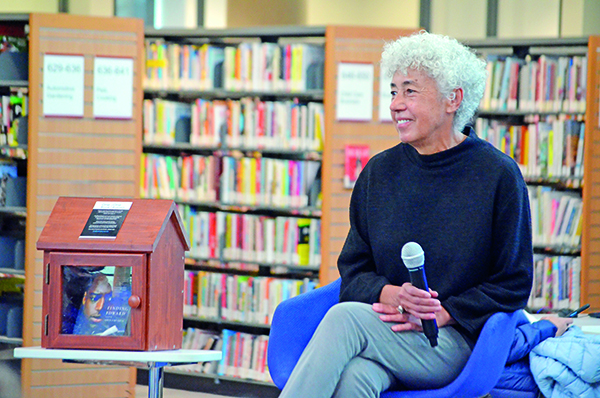|
The Auroran https://www.newspapers-online.com/auroran/one-book-one-aurora-closes-out-decade-with-a-message-on-value-of-history/ Export date: Mon Feb 2 15:02:21 2026 / +0000 GMT |
One Book One Aurora closes out decade with a message on value of history One Book One Aurora might be on ice this year, but the first decade of the program that encouraged all Aurorans to quite literally read from the same page closed with a reflective author talk that encouraged all Canadians to learn from history. This past fall, Sheila Murray, author of 2023 One Book One Aurora (OBOA) selection Finding Edward, led an author talk and question-and-answer afternoon at the Aurora Public Library. Finding Edward follows the journey of Cyril Rowntree who moves from Jamaica to Toronto in 2012. There, he faces the implications of being racialized in his new home, but also, after coming into the possession of scores of photos and letters from the 1920s, finds himself immersed in a different journey – that of Edward, who has a story all his own. Speaking at APL, Murray said Finding Edward's pick as the 2023 OBOA selection was a “highlight” of her own experience with the book, one which began not with its 2022 publication but with its first writing more than a decade earlier. Murray said as a brown person she “thought for a long time about what it means to be Black” generally-speaking and within the Canadian context. “One of the things I really wanted to explore with the book was that while everything has changed so much, society is so different than it was in the 1920s when Edward was born, [but] so much remains the same,” she said. “A big question for me is why… and I think I have an answer for that. It's complex, but it certainly has to do with things that are built into the way we live. We call that systemic racism.” This is an area of exploration close to her heart. Murray's father was Black-Jamaican while her mother was White-English. Both met in the aftermath of the Second World War, where her father was helping rebuild amid the destruction in Germany while her mother was running a travellers' hostel in the heart of London. Both became Quakers by the time they married, adopting a religion that has deep roots with social and racial justice, but Murray said it was “a hard time to be in England.” “Racism was thick on the ground and I can't imagine what…both of them would have gone through with three mixed-race kids,” she said. “I am sure some of it was pretty nasty. We never talked about it and we never thought to [ask them to] tell us about those experiences. They protected us as best they could from that very direct racism I know they must have experienced.” Finding Edward, she noted, took a few different forms since she wrote the first draft more than a decade before it was published, but the heart of the story remained the same: Cyril finding Edward, “and I guess the question is why is that so important?” “I took much inspiration from young Black friends in Jamaica,” she said. “I have spent a fair bit of time in Jamaica [with those] who emigrated absolutely determined to make a success of things, and they have – I am so proud of them. They come with an armour of ambition [and] just keep going. You don't look left or right, you do the school you need to do, you do the work you need to do, you build the career you need, and you get on with things. I couldn't write about someone like that because there was no time for contemplation and reflection. I needed something rather different. Cyril ends up in Toronto not because he chose to come, but because everybody said, ‘That's what you've got to do. You have to make a better life for yourself and you've got to go to Canada, the US, the UK, or other places like other people do….' You think you know something (from TV, social media, newspapers, friends who live in Canada) but when he lands he discovers there's a whole new set of rules that he is going to have to uncover to figure out. “The Black history that is in this book is a Black history that Cyril is either told personally, lives through personally, or it is from Cyril's direct experience of library, archives, books and conversations. It is certainly limited in that way. It's a fraction of the Black history in this country, of which there is a long history of Black settlement.” If one takes the adage of “we are our history” to heart, Murray looks to racialized groups where so much history has been taken away or expunged. “The missing of [history] can cause terrible consequences,” she said. “We all learn so much in what the Indigenous peoples have been telling us now as we sort of struggle with the truth of their experience in Canada and try to learn from ourselves what Truth & Reconciliation is. “How we know we belong, knowing we can live purposeful lives, make a contribution, do all of the things that make us complete human beings, these things matter and we can get there through our our belonging and through a sense of history that can inspire us.” By Brock Weir |
|
Post date: 2024-01-04 18:58:28 Post date GMT: 2024-01-04 23:58:28 Post modified date: 2024-01-04 18:58:30 Post modified date GMT: 2024-01-04 23:58:30 |
|
Export date: Mon Feb 2 15:02:21 2026 / +0000 GMT This page was exported from The Auroran [ http://www.newspapers-online.com/auroran ] Export of Post and Page has been powered by [ Universal Post Manager ] plugin from www.ProfProjects.com |